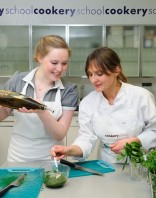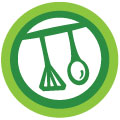 Kitchen confidential: Which cookery school? Take a look at our insider’s guide to choosing cookery schools and cookery courses based on our experts’ experience of visiting dozens of culinary establishments, from kitchen-sink set ups to state-of-the-art academies.
Kitchen confidential: Which cookery school? Take a look at our insider’s guide to choosing cookery schools and cookery courses based on our experts’ experience of visiting dozens of culinary establishments, from kitchen-sink set ups to state-of-the-art academies.
Web presence: Your first port of call is likely to be the cookery school’s website. This is its shop front, and like any deli or food store it needs to look good. Is the website well designed and attractive? Does it display personality? Is easy to navigate? Does it provide you with the information that you are seeking – quickly. If not, you may wish to contact the school – this will enable you to clarify matters such as who will be hosting the course (what is their background and expertise? – avoid courses run by grumpy old catering school chefs like the plague); the level of experience required; maximum number of participants per class; will you have your own kitchen station and what is the balance between hands-on cookery and demonstrations.
Peer tip-offs: If a genuine foodie friend or colleague has vouched for a course then that’s a pretty solid endorsement. Apart from that, the national papers intermittently do round-ups which invariably feature the same old suspects (despite the fact that there are hundreds of cookery schools out there, some of which are truly amazing), and local papers will write up a new school.
Bloggers: On the whole there are not many reviews of individual cookery schools available online. But this is an area where bloggers deliver more information than traditional press. Well respected and highly-rated bloggers often file in-depth reviews of cookery schools and courses complete with a stream of photos which helps to give an idea of ambience and the quality of the kitchen and equipment. Just be aware that it is unlikely that the bloggers will have paid to take the course so do read between the lines. Alternatively try searching for mentions of the school on Twitter.
Money matters: Prices vary hugely at cookery schools from £30 to £250 and upwards for half and one-day courses. In fact, you can double the last figure if it’s a masterclass and meal with a Michelin-starred chef. Check what is included in the cost beforehand. A smart recipe folder and branded apron are all very well but do you really have need (and room) for them at home. Is lunch and wine included? Can you take home what you’ve cooked? Is your tutor really contactable after the course to run through any recipe issues?
Food provenance: Nearly all schools, like restaurants these days, declare their passion for using only the freshest, seasonal, locally sourced produce on their courses. The best schools will stick to this vow and you should come away having cooked, tasted and discovered some genuinely fab food from just down the road. Chances are you’ll live within the area so mine the course leader for tips on where to buy the best local ingredients.
Deals and discounts: Look out for offers and last-minute deals on cookery school websites. Try to choose a cookery school because it meets many of your main criteria rather than because it’s offering 75 per cent off on a national voucher scheme.
Tell us about your experiences of booking or attending cookery schools by using the comments section below.
Visit our homepage for For more than 125 reports on the best cookery schools in the UK and Ireland
